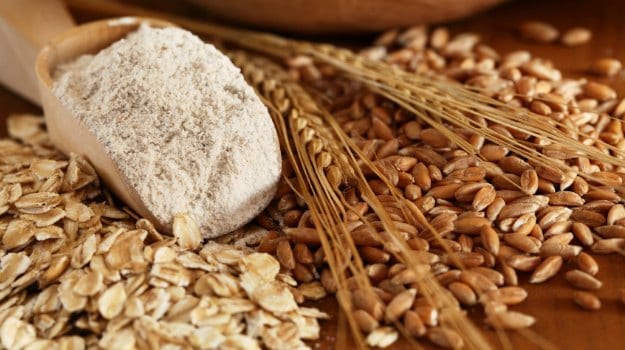When your digestion is not as good as it should be, your body sends you clear signals, such as excessive gas, bloating, high acidity, frequent lose motions, or bowel irregularity. We often assume that these conditions are beyond our control. But the good news is that they don’t have to be. Through a few simple lifestyle changes in diet and physical activity, you can help your digestive system do the job it is meant to do more efficiently: fully deliver and absorb nutrients for overall health and smoothly rid the body of its unwanted waste.Here are five things you need to know about how to keep your digestive system clean and functioning well. 1. Drink plenty of water
Dehydration is known to wreak havoc on our digestive system. We need to drink at least 3 litres of water a day to keep our system well hydrated. Our intestines use water to push the digested waste through the system and convert it into a form that can be easily eliminated. Continuous low water intake leads to constipation and the build-up of toxins in the body, and this in turn increases your risk of developing more complicated digestive issues. So make sure you consciously take the time to drink the amount of water you need every day, at regular intervals. Don’t wait to be thirsty. (Buy products that help with digestion from SmartCooky) 2. Avoid foods that irritate your digestive tract Some people can tolerate a large amount of spices and others cannot. Understand what works for you and eat accordingly. Substances that often do not suit everyone are: red chillies, hot spices, caffeine, alcohol, desserts rich in sugar and fat. Other substances that irritate the digestive tract are nicotine and certain types of medication. While spicy food can irritate the stomach lining in some people, it does not lead to ulcers. It can however exacerbate existing ulceration in the intestines or stomach. The secret to a healthy digestive system is to either avoid or balance your intake of substances that cause irritation to your system.
2. Avoid foods that irritate your digestive tract Some people can tolerate a large amount of spices and others cannot. Understand what works for you and eat accordingly. Substances that often do not suit everyone are: red chillies, hot spices, caffeine, alcohol, desserts rich in sugar and fat. Other substances that irritate the digestive tract are nicotine and certain types of medication. While spicy food can irritate the stomach lining in some people, it does not lead to ulcers. It can however exacerbate existing ulceration in the intestines or stomach. The secret to a healthy digestive system is to either avoid or balance your intake of substances that cause irritation to your system.
 3. Make dietary fiber your friend Plan your meals to include fiber-rich foods such as whole grains, oatmeal, beans, nuts, fruit and plenty of vegetables. Dietary fiber helps ensure that your gastrointestinal tract works smoothly. It makes sure that the digestive process moves at a pace that enables your body to efficiently absorb nutrients from the ingested food. Dietary fiber also helps regulate stool consistency and movement of food through the system.(Buy High-Quality Fiber-Rich Foods)
3. Make dietary fiber your friend Plan your meals to include fiber-rich foods such as whole grains, oatmeal, beans, nuts, fruit and plenty of vegetables. Dietary fiber helps ensure that your gastrointestinal tract works smoothly. It makes sure that the digestive process moves at a pace that enables your body to efficiently absorb nutrients from the ingested food. Dietary fiber also helps regulate stool consistency and movement of food through the system.(Buy High-Quality Fiber-Rich Foods) 4. Add probiotics to your dietExamples of probiotic sources are yogurt, soy milk and dark chocolate. Probiotics are live bacteria and yeast that have a beneficial effect on our digestive system.They keep the body healthy by combating the effects of poor diet, antibiotics and stress. Probiotics also help enhance nutrient absorption, strengthen the immune system and possibly even help treat irritable bowel syndrome. While they are naturally present in our body, it helps to consume foods that are probiotic in nature.
4. Add probiotics to your dietExamples of probiotic sources are yogurt, soy milk and dark chocolate. Probiotics are live bacteria and yeast that have a beneficial effect on our digestive system.They keep the body healthy by combating the effects of poor diet, antibiotics and stress. Probiotics also help enhance nutrient absorption, strengthen the immune system and possibly even help treat irritable bowel syndrome. While they are naturally present in our body, it helps to consume foods that are probiotic in nature.

5. Exercise and keep stress levels downToo much stress or anxiety causes your digestive system to go into overdrive. Stress affects digestive tract permeability, causes an imbalance in gut bacteria and increases your risk of inflammation. Moderate exercise on a daily basis has shown to combat this stress effectively, restoring a sense of balance in physical, mental and emotional well-being. Find stress-reducing activities that you enjoy and practice them on a regular basis to keep your digestive system healthy.
 Our digestive system does more than simply digest food. It improves resistance to infection, enhances nutrient absorption and prevents the formation of kidney and gall stones.So start by making the right food choices and lifestyle modifications, and your digestive system will help you stay in the pink of health.
Our digestive system does more than simply digest food. It improves resistance to infection, enhances nutrient absorption and prevents the formation of kidney and gall stones.So start by making the right food choices and lifestyle modifications, and your digestive system will help you stay in the pink of health.
About the Author :Dr. Mandar completed his post graduate training in advanced endoscopy and EUS from Technion Institute, Haifa, Israel. He has trained with world renowned senior endoscopic surgeon, Dr. Amol Bapaye, at the Digestive Diseases Department at Deenanath Mangeshkar Hospital. He started Lumina Endoscopy Centers at 2 places in and around Pune city to be able to provide state-of-the-art endoscopy facilities under one roof. He is also in-charge of the GI unit at Sahyadri Hospital Bopodi.
Disclaimer:The opinions expressed within this article are the personal opinions of the author. NDTV is not responsible for the accuracy, completeness, suitability, or validity of any information on this article. All information is provided on an as-is basis. The information, facts or opinions appearing in the article do not reflect the views of NDTV and NDTV does not assume any responsibility or liability for the same.
Dehydration is known to wreak havoc on our digestive system. We need to drink at least 3 litres of water a day to keep our system well hydrated. Our intestines use water to push the digested waste through the system and convert it into a form that can be easily eliminated. Continuous low water intake leads to constipation and the build-up of toxins in the body, and this in turn increases your risk of developing more complicated digestive issues. So make sure you consciously take the time to drink the amount of water you need every day, at regular intervals. Don’t wait to be thirsty. (Buy products that help with digestion from SmartCooky)




5. Exercise and keep stress levels downToo much stress or anxiety causes your digestive system to go into overdrive. Stress affects digestive tract permeability, causes an imbalance in gut bacteria and increases your risk of inflammation. Moderate exercise on a daily basis has shown to combat this stress effectively, restoring a sense of balance in physical, mental and emotional well-being. Find stress-reducing activities that you enjoy and practice them on a regular basis to keep your digestive system healthy.

About the Author :Dr. Mandar completed his post graduate training in advanced endoscopy and EUS from Technion Institute, Haifa, Israel. He has trained with world renowned senior endoscopic surgeon, Dr. Amol Bapaye, at the Digestive Diseases Department at Deenanath Mangeshkar Hospital. He started Lumina Endoscopy Centers at 2 places in and around Pune city to be able to provide state-of-the-art endoscopy facilities under one roof. He is also in-charge of the GI unit at Sahyadri Hospital Bopodi.
Disclaimer:The opinions expressed within this article are the personal opinions of the author. NDTV is not responsible for the accuracy, completeness, suitability, or validity of any information on this article. All information is provided on an as-is basis. The information, facts or opinions appearing in the article do not reflect the views of NDTV and NDTV does not assume any responsibility or liability for the same.
Advertisement








